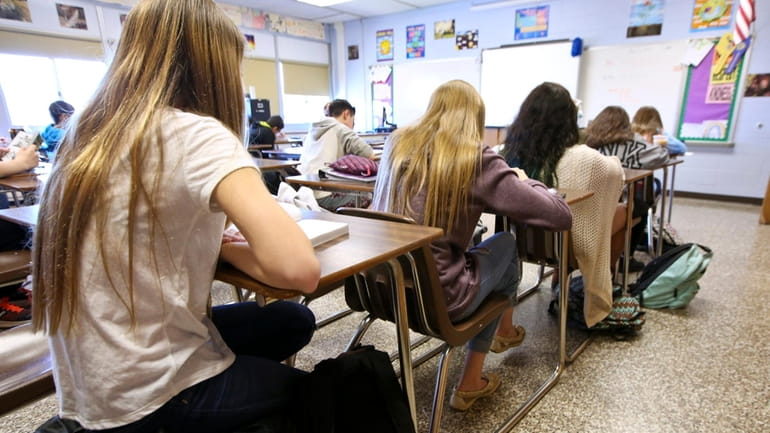State should expand early college/dual enrollment programs for high school students

Early college/dual enrollment programs can be transformative for high school students. Credit: Newsday/John Paraskevas
High school students on Long Island and around the state have been able to earn college credits while still in high school for many years. Many school districts have outstanding programs through collaborations with colleges/universities.
Since college is so expensive and not always accessible to every student, it is time for New York to enter a new era of academic advancement. Early college/dual enrollment programs can be transformative for high school students by offering unique opportunities to amplify educational horizons and better equip students for the challenges that lie beyond the classroom.
Early college/dual enrollment programs allow students to simultaneously earn high school and college credit by taking courses at or offered by accredited colleges and universities. Our organization of school counselors provides guidance and recommendations for implementing and overseeing these programs across the state.
The New York State School Counselor Association believes these programs provide students with the opportunity to challenge themselves academically and that these programs should be available in all of New York's public schools. Though more than half of New York's high schools offer a dual enrollment program, only 15.8% of the state's high school students were enrolled in such a program in 2022, according to state Education Department data.
Access to these programs would help our high-schoolers make knowledgeable choices about their postsecondary education and career plans. This would enhance college accessibility and affordability by giving students a head start on their college education and thus saving students and their parents time and expense. This would, in turn, strengthen the partnership between our K-12 schools and colleges and universities.
To make these programs rigorous, accessible, and equitable, we strongly suggest that the programs contain academic equivalence with the courses being offered to students by their high schools and that they be taught by qualified instructors with appropriate credentials and experience.
Also important is the factor of inclusivity. Dual enrollment programs should be inclusive and accessible to all students, regardless of their socioeconomic background, geography, race, gender, or abilities, and institutions must ensure that dual enrollment credits seamlessly transfer to colleges and universities within New York State.
It is critical that K-12 students have access to support services like counseling, academic advising, and academic support services to succeed in dual enrollment programs. Quality assurance should consist of regular evaluations and assessments of dual enrollment programs to maintain high-quality standards.
Administrative support is also crucial to success and to that end, we suggest creating an Office for Early College/Dual Enrollment Programs at the state Education Department with regional support centers and stable funding to support these initiatives.
Collaboration between K-12 schools, colleges, and universities is critical to foster successful dual enrollment programs. It is essential to establish clear communication channels, data-sharing agreements, and partnerships for program sustainability.
We advocate for policies that support dual enrollment programs, including pending legislation that provides TAP funding for school districts hosting dual enrollment programs and measures that promote equitable access for all students and provide resources and professional development opportunities for school counselors, educators, and administrators involved in dual enrollment to ensure best practices are followed.
The time to make this investment is now. Dual enrollment programs have the potential to significantly benefit New York State students in their pursuit of higher education and career success. We should do everything we can to help them on that journey.
This guest essay reflects the views of Robert Rotunda and Kelly Whitney-Rivera, executive director and advocacy & public policy chair, respectively, of the New York State School Counselor Association.
This guest essay reflects the views of Robert Rotunda and Kelly Whitney-Rivera, executive director and advocacy & public policy chair, respectively, of the New York State School Counselor Association.
